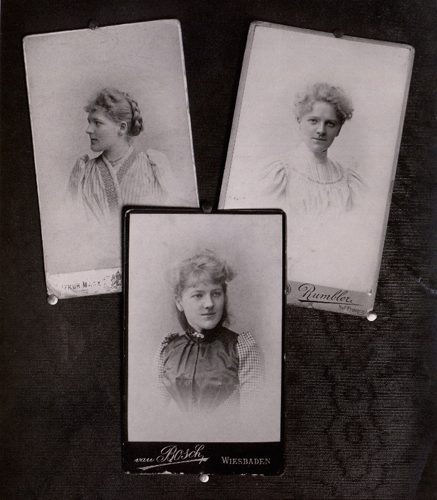1. Wiesbaden

On 14 February 14 - with the participation of the composer - the first concert dedicated exclusively to Reger's work takes place at the Berlin Singakademie, including the world premiere of the Piano Trio in B minor, Op. 2, the Violin Sonata in D minor, Op. 1, in its complete form (see 1891), the Cello Sonata in F minor, Op. 5, and lieder. In his review, Otto Leßmann accuses Reger of exaggerating the Brahmsian traits and recommends a change of direction (Rezension). A first crisis is in the offing because of absent artistic success, which is intensified by an unhappy love for Tilly« Hilf (see illustration), the daughter of a Wiesbaden government councillor; the reasult is increasing isolation, depression and flight into alcohol.
In autumn Reger is motivated again through Arthur Smolian's positive review Max Reger und seine Erstlingswerke in the Musikalisches Wochenblatt. Smolian, who was then a teacher at the conservatoire in Karlsruhe, provides the contact to Felix Mottl, General Music Director there, and Heinrich Ordenstein, Director of the Conservatoire, but Mottl's plan to get Reger's Piano Trio, Op. 2, performed in Karlsruhe, fails. In the new edition of his music dictionary, Hugo Riemann calls Reger a “rich, promising compositional talent”1. At the Wiesbaden conservatoire, Reger teaches theory in addition to piano and organ and continues to give private piano lessons. In September he sends to Eugen d'Albert some virtuoso Bach transcriptions (Bach-B1) and transcribes, to d’Albert’s great satisfaction, his Overture to Grillparzer's »Esther« for piano four hands (RWV d'Albert-B1).
Postal items from this year whose sender or addressee is Max Reger.
Images from the Max Reger Foto Gallery that originate from this year and have a direct reference to Max Reger.
Reference
Max Reger Biography – 1894, in: Max-Reger-Portal, www.maxreger.info/biography/1894, Max Reger Biography Data, V. 3.2.0, last check: 22nd December 2025.